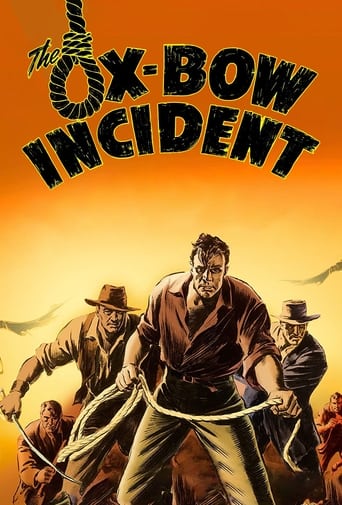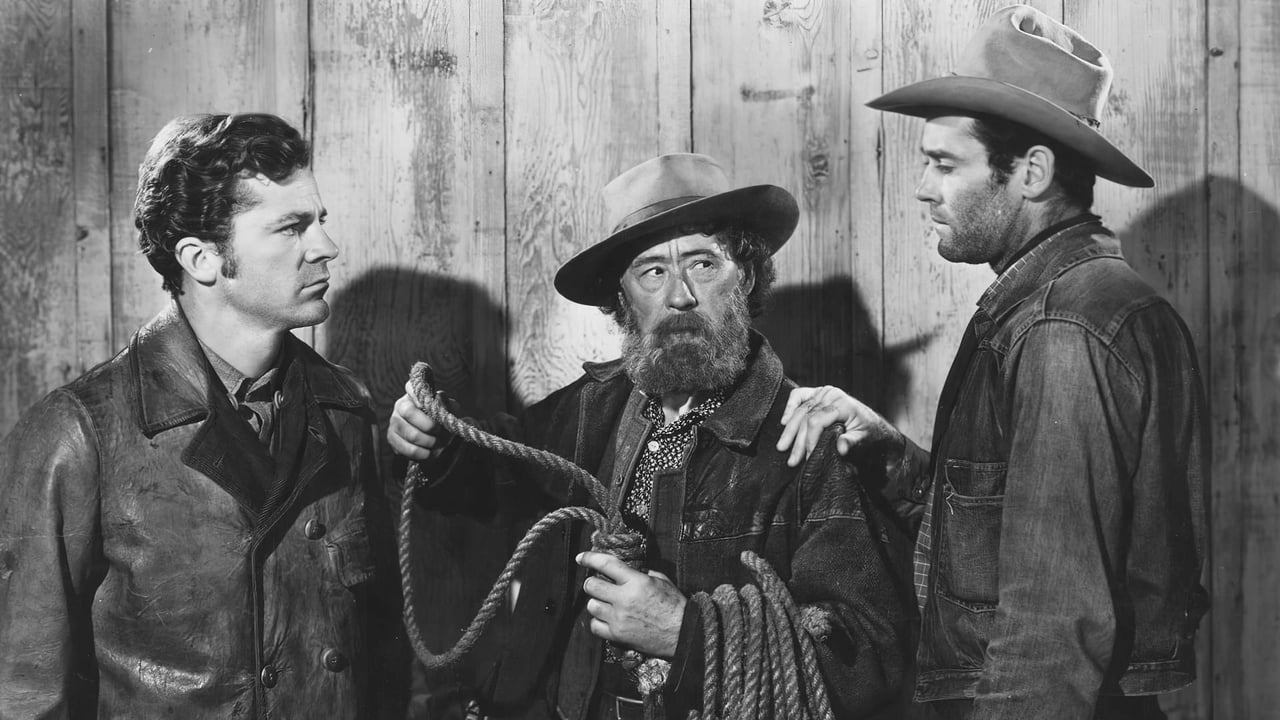JohnHowardReid
Lynching - a peculiarly American phenomenon of mob violence. No less than 231 such acts were recorded in 1892. Even in 1943 three lynchings were reported) - had been dealt with in other films, most notably Fritz Lang's Fury (1936) and Mervyn LeRoy's They Won't Forget (1937). And it has been the theme of some notable films since, including Sound of Fury, Storm Warning, Riding Shotgun, Silver Lode and Intruder in the Dust. But none of these similar pictures take the uniquely objectivist view of The Ox-Bow Incident. It is a film with many villains, some familiar (the mischief-stirring town drunk, for instance, but played here with such powerful malevolence by Paul Hurst as to seem horribly original), some quite extraordinary by the prissy standards of 1942 Hollywood (particularly the loud-mouthed, lewd sadist given such vitality by Jane Darwell, of all people), ranged against twelve heroes - twelve good men and true.But examine these twelve men more closely. Three of them are the victims, powerless in their own defense: A feeble-minded, fearful old man (Francis Ford in one of his most convincing roles); a cocky but philosophically resigned Mexican (Anthony Quinn); and most importantly, an eloquently idealistic but extraordinarily stupid and impractical greenhorn living in a cloud-cuckoo land of mind-boggling naivety. It is one of the film's faults that neither as written nor played is this character sympathetic or believable. He is too stupid for credibility. We assume that it is all an act, that he will turn out to be the cunning bushwacker the villains suppose him to be. No doubt this is intentional - the director seizes upon the actor's immaturity and weaknesses to fill out the character - but it doesn't work, because we feel so little sympathy for him.Point one for curious objectivity. Point two is the fact that two of the good guys are away and arrive too late on the scene to prevent the tragedy. That makes The Ox-Bow Incident really unique.Point three are the seven men left: A well-intentioned but patronized Negro (played with a simple if "yes, massah" dignity by Leigh Whipper); a reluctant-to-be-involved cowhand (Fonda) and his even less willing buddy (Morgan); a weak, impotently defiant mother's boy (Eythe); two characters so minor they don't matter; and finally, a garrulous, whining old man (cleverly pitched by Harry Davenport to antagonize or irritate any audience).This indeed is a remarkable assembly of uniquely unsympathetic characters. But there are more: A heroine (Mary Beth Hughes) who has reneged on her promise to marry the cowhand and has instead hitched herself to a sneering, supercilious San Franciscan (Meeker); a pompous windbag of a judge (Briggs); his frosty housekeeper (Margaret Hamilton).We could go on. Remember these are the "good" people. We have scarcely mentioned the other side, led by Frank Conroy's fanatic old Confederate, and including Paul E. Burns in a rare, unsympathetic role as a rope-wielding lyncher and impressively-visaged Rondo Hatton who has no dialogue but can be glimpsed at the back of several scenes.Yes, The Ox-Bow Incident is unique. An uncompromisingly dark film with no conventional heroes or romance. Yet, despite its defiance of all the conventions, its powerful message succeeds in coming across.This success of course is no accident, but is the result of a tight unified script being convincingly played, set and directed, being atmospherically photographed and scored. True, Ox-Bow is no towering masterpiece of filmcraft - the film's limited budget has seen to that: The few actual location exteriors (including a memorable image of the hard-riding posse with Sparks trailing behind and gradually becoming enveloped in their dust) make an unwelcome contrast with obvious studio sets. The direction is inclined to be too stylish with the characters arranged in toe-the-line tableaux (an impression reinforced whenever Frank Conroy is on-screen, he stands so stiffly. Admittedly, this is certainly in character). However, these are minor defects, which do little or nothing to detract from the overall somber mood. Even the comedy is sad. And Mockridge's score with its plaintive "Red River Valley" played by a lonely concertina over the paralleled opening and closing shots is a memorable finishing touch.A courageous film, a unique film, a powerfully engrossing film, a film years ahead of its time, a film with a soberingly realistic atmosphere. The Ox-Bow is the real West. Even a much-touted realistic film like Cowboy (1958) is glossily romanticized. You'd have to go back to the silent days for similarly realistic atmosphere - particularly to Hell's Hinges (1919) directed by and starring William S. Hart.
JLRVancouver
A Western by time and place only, the Oxbow Incident is universal cautionary tale about the temptation and dangers of mob justice. A popular man is reported dead and a mob promptly gathers with the goal of bringing the killer to justice. Unwilling to wait for the sheriff, and therefore due process, the mob sets out and the bulk of the film is about what happens when they find the potential killers. Fonda and Morgan play a couple of cowpokes who join the mob because not to do so might arouse suspicion that they are the killers. A couple of other men join in the hope of preventing a potential lynching, perhaps one person rides out because he is truly 'bad', but for the most part the mob are people caught up in the excitement of the hunt and the promise of swift justice. The message that a person is innocent until proven guilty and that suspicions, allegations, accusations or, hear-say are not sufficient bases to pass judgement, is as true now when they are spread on-line as it was when they were spread on horseback. Interesting that the film was made in 1943, when due process was often put aside in the name of war-time 'necessity'.
carl-axness
This is my favorite western. I have seen it a number of times and with the political landscape of the USA in 2017, I recommend it to everyone. Outstanding acting by all, and I especially enjoyed the part and acting of Anthony Quinn. In my opinion there is no movie that better exhibits the concept of a mob mentality and its possible consequences.
Hitchcoc
When I first saw this film, I couldn't get it out of my head. Three men are executed by vigilante justice, put forth by a bigoted, but respected man. I couldn't help but put myself in the place of those men, trying to logically remove myself from the the grasp of these people. There is no reason to hurry the verdict. It is about people who get caught up in a mob mentality and give up their common sense and integrity for expediency. The hard thing is that there is nothing anyone can do to right this. There is no bring people back to life. About all we can determine is that these men will have to live with this decision for the rest of their lives. The problem with mob rule, is that they all have excuses for their actions. I thought. I thought. I thought. See this film but be prepared to think about it for a long time.



 AD
AD



